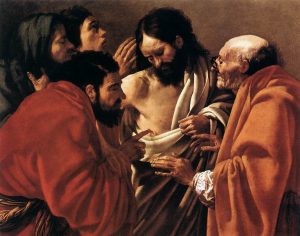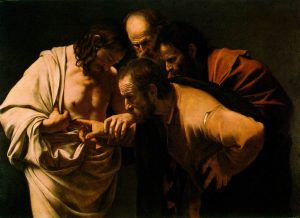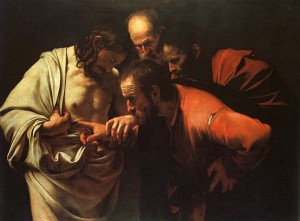\Illuminations on the Lectionary readings for April 16, 2023 (Easter 2A)
First Reading: Acts 2:14a,22-32
The Great Fifty Days of Eastertide have now begun, and our readings for the next six Sundays will direct our thoughts toward the meaning of resurrection.

The incredulity of St. Thomas (c.1622), oil painting by Hendrick ter Brugghen (1588–1629). Rijksmuseum, Amsterdam.(Click image to enlarge)
We’ll hear of the apostles in the early church following Jesus’ way; mysterious appearances of the resurrected Christ, and Jesus’ own words about God’s promise of eternal life. Our first readings through the period will draw from the Acts of the Apostles. That begins on Sunday as we hear Peter on the day of the first Pentecost, addressing an amazed crowd. In a fluent sermon Peter declares Jesus the resurrected Messiah promised by the prophets. Then he baptizes 3,000 new Christians made believers by the amazing events of the day.
Psalm: Psalm 16
In his talk to the people of Jerusalem in the first reading from Acts, Peter quoted verses 8 through 11 of Psalm 16. Now we chant the full Psalm, and it conveys the same broad promise in slightly different words that may be summarized as: God teaches us, God watches over us; God protects us, and God gives us joy forever.
Second Reading: 1 Peter 1:3-9
The two short epistles of Peter offer us fascinating glimpses into the developing ideas of Christ, resurrection and hope for salvation in the early church. They were probably written in Asia Minor (modern Turkey) around the end of the first century. Perhaps writing to reassure a persecuted community suffering “various trials,” the author reminds them that through Christ’s resurrection and life, God offers us the joy of a lasting inheritance and salvation earned through our faith.
Gospel: John 20:19-31
What do the disciples do in response to Mary Magdalene’s joyous announcement that Jesus has risen from the dead? They hide in fear in a locked room, doubting the woman’s declaration. Then Jesus suddenly appears among them! He shows his rejoicing friends his wounds, then sends them into the world in peace, with the breath of the Holy Spirit, to declare the Good News. Then comes Thomas, who wanted to see and touch Jesus’s wounds before believing that he had truly risen. Yes, the wounds are real. This is no ghostly spirit! “Have you believed because you have seen me,” John tells us that Jesus asks. “Blessed are those who have not seen and yet have come to believe.”



